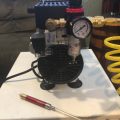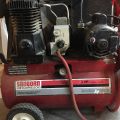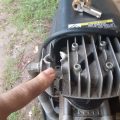It’s a good question… are air compressors safe? As with many things, the answer is YES! Then again, in some circumstances the answer could be no. Why? Whether a certain compressor is safe or not depends on how it’s been used before, how it’s being used now, and the condition of the air compressor being used.
Here are some things to consider:
How old the air compressor?
The age of a compressor is important to know about the use of an older air compressor.
Compressor tanks are pressure vessels, built to certain standards to reduce the possibility of tank rupture under pressure. Old air compressor tanks may suffer from the following:
- small air compressors typically acquired for home or small workshop use can be particularly susceptible to degrading of the tank due to lack of tank maintenace – not draining the tank of water after use for example
- the materials used in tank construction can have quality issues – if the compressor is cheap to buy all components on the compressor are equally cheap / lower quality including the tank and any tank-interior corrosion resistance coatings if any
- the pressure relief valve might be seized with the potential for tank overpressure and rupture if the pressure switch fails
Even if a compressor has been around for years and years, make sure to drain the tank after use and test the PRV to be sure it will actually move to open and vent air if necessary.
Use of the air compressor.
Air compressors are essentially dumb devices. They use an electric motor to turn a pump that pulls air into a cylinder and the cylinder drives that air into a tank even while it’s pulling in more air via a set of flapper or finger valves to push into the tank on the next cycle.
Add more air to the tank and the air pressure in the tank goes up. Lower the volume of air in the tank, and the air pressure goes down.
The compressor owner cannot forget that the energy contained within compressed air and the air movement by that energy can be deadly. With careless use:
- it is possible to drive air into the body with a blow gun, the air getting under the skin and possible entering the bloodstream with extremely negative results
- careless use of a blow gun can propel work bench or table stop dust particles into the eyes causing pain and possible eye damage, and bystanders are particularly susceptible to eye damage this way
Compressor are noisy!
Since many compressors have virtually no sound deadening, they can be extremely noisy when running. The noise level could be such that it damages the hearing.
- if possible, put the compressor in a separate room or as far from the air-user as possible, and use a longer air line to bring air to the work place
- if that’s not possible wear sound deadening ear-defenders to save your hearing – long term noise will damage the hearing in later years – trust me on this
Compressors get very hot!
The compressing of air generates a lot of heat. The longer the compressor runs between rest cycles, the hotter the pump surfaces will get.
- any compressor without a heat shield over the pump should be considered as hot enough to burn the skin if the compressor has been running for any length of time
Are air compressors safe?
Yup, as long as they are maintained properly, and are used in a careful fashion and treated with respect.





![Using an Air Compressor to Clean Your Computer [GUIDE]](https://fix-my-compressor.com/wp-content/uploads/2022/12/cleaning-a-pc-with-an-air-compressor-120x120.jpg)
